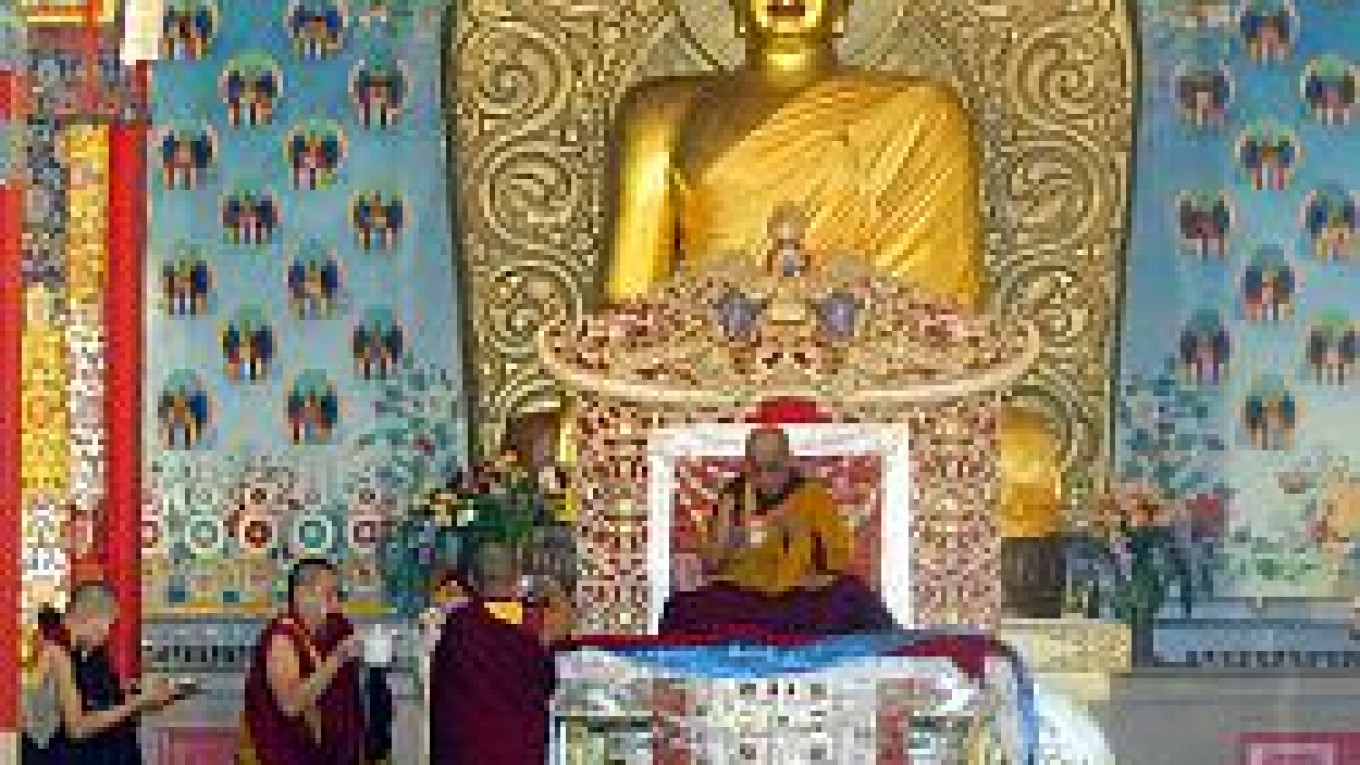China expressed dismay over the trip by the Buddhist spiritual leader, who lives in exile in India and leads Tibetans who have resisted a half century of Chinese rule.
"We cannot understand why Russia granted him permission to visit, and we hope that Russia can strictly abide by ... relevant political agreements between the two sides," a Chinese Foreign Ministry spokeswoman said.
As believers set up small stools outside the elaborately decorated temple at the Khurul Monastery to await the morning prayers, the Dalai Lama sat on a raised platform inside under an elaborately carved gold statue of Buddha, surrounded by urns of chrysanthemums and roses and monks sitting on carpets. They ate white rice and raisins off white china -- the color signifying purity.
Pilgrims had to walk about two kilometers through a wind-swept field to reach the monastery, about six kilometers northeast of the Kalmyk capital, Elista, undergoing seven security checks by police. As they entered the monastery complex, they paused to touch the 18 drums lined up on both sides, under the complex's carved roofs.
"There is a link of many generations between your people and Tibet," the Dalai Lama told his followers through an interpreter.
Many pilgrims carried small silk scarves with them, symbolizing a meeting with Buddha. Each time they saw the Dalai Lama -- who, in keeping with Tibetan tradition, was recognized at age 2 as the incarnation of Avalokiteshvar, the Buddha of Compassion, and the reincarnation of his deceased predecessor -- they waved the scarves to prove they came with pure hearts and souls.
The Dalai Lama consecrated a temple built at the monastery in 1996.
The spiritual leader arrived Monday in Kalmykia, a republic where about half the 300,000 residents are Buddhists. The Foreign Ministry said it had granted him a visa on the grounds that he limit his activities in Russia solely to pastoral purposes, and he told reporters his purpose was to advance "human values."
Pilgrims brought pictures of loved ones for blessing. Maria Bembeyeva, accompanied by her daughter Angela, brought photos of her son Tseren, who is serving as a military driver in Chechnya.
"I believe the Dalai Lama will send grace on him and ... I hope that his military service will be as pure and white as our thoughts today," Bembeyeva said.
The Dalai Lama fled into exile after an aborted uprising against Chinese rule in 1959, and he travels frequently to conduct Buddhist ceremonies and seek support for his campaign for Tibetan political and cultural rights.
The Dalai Lama's visit "in no way means some kind of change in our position on Tibet, which is an inalienable part of China, and we fully support the sovereignty and territorial integrity of the Chinese People's Republic," Foreign Minister Sergei Lavrov said in Vientiane, Laos, on Monday. "Our Chinese friends know that."
A Message from The Moscow Times:
Dear readers,
We are facing unprecedented challenges. Russia's Prosecutor General's Office has designated The Moscow Times as an "undesirable" organization, criminalizing our work and putting our staff at risk of prosecution. This follows our earlier unjust labeling as a "foreign agent."
These actions are direct attempts to silence independent journalism in Russia. The authorities claim our work "discredits the decisions of the Russian leadership." We see things differently: we strive to provide accurate, unbiased reporting on Russia.
We, the journalists of The Moscow Times, refuse to be silenced. But to continue our work, we need your help.
Your support, no matter how small, makes a world of difference. If you can, please support us monthly starting from just $2. It's quick to set up, and every contribution makes a significant impact.
By supporting The Moscow Times, you're defending open, independent journalism in the face of repression. Thank you for standing with us.
Remind me later.


